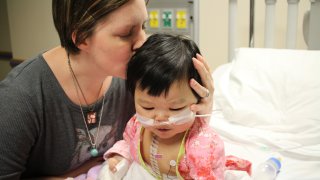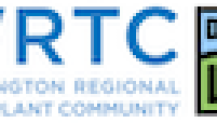

The following content is created in partnership with the Washington Regional Transplant Community (WRTC). It does not reflect the work or opinions of NBC Washington's editorial staff. Click here to learn more about the WRTC.
In honor of Asian American and Pacific Islander American Heritage Month, here’s the story of a toddler who came from China needing a heart transplant.
“When we adopted her, we actually didn’t expect her to live long,” Joanna Billigmeier recalls. “We thought we were adopting a child who would pass away very quickly—she was labeled terminal. We brought her to the states; we were just thankful to have her home.”
We've got the news you need to know to start your day. Sign up for the First & 4Most morning newsletter — delivered to your inbox daily. Sign up here.
Joanna is telling the story of Paisley, a baby born in 2012 in China with just half a heart. Joanna and her husband Josh, Maryland residents, are parents to four children adopted from China—three of them (including Paisley) have heart defects. Of Paisley, Joanna says, “We were just hopeful that she would be able to have a heart surgery that would buy her some time.” That surgery, the Fontan procedure, would have redirected blood from the girl’s lower body directly to her lungs, bypassing the heart.
We saw this picture of this little girl—this little face . . . and we just knew she was our kid no matter what.
Joanna Billigmeier
Better yet, though, the Children’s National Hospital in Washington, D.C. decided Paisley qualified for a more promising surgery: a heart transplant. The hospital added Paisley to the national transplant waiting list in September 2015. By November that year, Paisley had a new heart, coming to her from a family who tragically lost their little girl. (Paisley calls that little girl her “heart hero.” The Billigmeiers don’t know the donor family’s identity, though they’re incredibly grateful for their selfless and lifesaving gift and Paisley has written letters of appreciation to them, sent via the Washington Regional Transplant Community.)
Aside from the guidance the Billigmeiers received from Children’s National Hospital, the couple also had a couple of other Sherpas to follow—the first being a hospital social worker. “She really held our hands through the whole transplant process,” Joanna says. “From being there for us to just knowing what Paisley needed; bringing her a toy when she needed it; knowing if she was going to have a bad day and what she would need to get through it; knowing if she needed a change of pace; knowing what nurses would be good for her—just everything. She really saved our lives so many times in the hospital.”
Second, the Billigmeiers received guidance from another family who went through the same experience, they too with a little girl from China who had a heart transplant a year before Paisley. “We just sort of followed in their footsteps,” Joanna says. “We were very lucky to be close to them and have a mentor family in them. I think not all families have that, but that was very special for us. Without them, I think we would’ve lost our minds.”
Paisley too was lucky her parents brought her back to America. In many Asian countries, people believe the body needs to be whole for the soul to reach afterlife—making organ donation taboo. Even here in America, the Asian community isn’t as quick to check yes in that organ donor box on a driver’s license: While 8.3 percent of total candidates waiting for transplants are Asian, they comprised 3.3 percent of organ donors in 2019, according to the U.S. Department of Health and Human Services Office of Minority Health. If nothing else, this can hurt Asian Americans who need transplants, since the odds of a successful organ match increase when donors share the same ethnicity.

Today, Paisley is seven years old and healthy, but for the fact that she’s immunosuppressed (because she must take medication to keep her body from rejecting the heart, her immune system is very susceptible to disease). Compared to the baby the Billigmeiers adopted before surgery, “She is a completely different person,” Joanna says. “She went from not walking—just laying on the couch and being a very sad, sad little person—to playing and laughing and running. We never heard her laugh until after she got a heart. She became the happiest most vivacious little girl I’ve ever seen in my life. All our friends say they’d never seen anyone live life like they see Paisley live life.”
Paisley loves to eat, her favorite is meat—bacon and ribs, in particular. She likes watching shark documentaries. And unicorns. She enjoys playing outside with her brothers and sisters. Ask her what she wants to be when she grows up and she’ll tell you, a vet. And while she doesn’t yet have a pet, she wants a puppy. (Her mom responds, “We are not sure about this puppy business”.)
Through all this, though, the question remains: How can the Billigmeiers go through all the trouble and heartache of adopting a baby—from China, yet—that would most likely pass away?
“Honestly, we saw this picture of this little girl—we saw this little face," Joanna remembers. "She has the most beautiful little eyes. And we just knew she was our kid no matter what. My husband says, instead of thinking, Is she the right kid for us? he started thinking in terms of, Are we the right people for her? What kind of things could this kid need? instead of “What do we need? Do we need a kid who’s going to live forever? Do we need a kid who’s going to outlive us? We would love that, but a kid needs a family a kid needs love, a kid needs a mom and dad, a kid needs someone who holds them if they die, and those are all things that we can give her. And really just looking at her, we just knew that she was ours.”
Even now, during the COVID-19 pandemic, organ transplants are still happening. Click here to visit Washington Regional Transplant Community (WRTC), the local nonprofit organ procurement organization responsible for recovering and distributing organs used in lifesaving transplants. Learn the facts to help you make a legal and informed decision about registering to be an organ donor.

